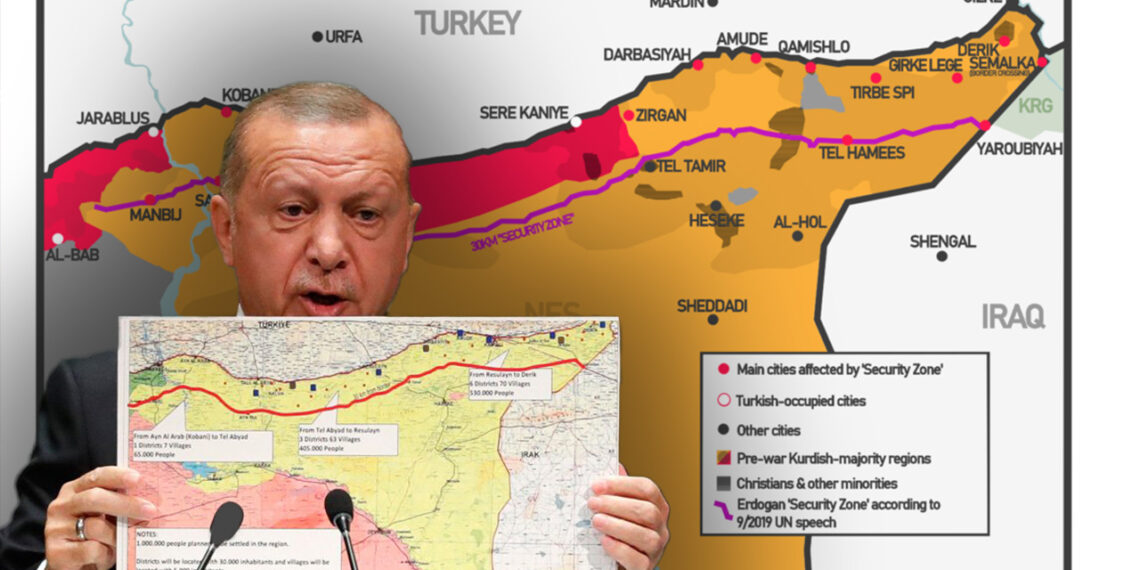The US State Department is under fire for dismissing evidence of ethnic cleansing in Afrin, Syria in a recent statement.https://t.co/GMbuNhgSPE pic.twitter.com/ptxHrdtwOF
— MedyaNews (@1MedyaNews) August 6, 2023
US State Department Spokesman Matthew Miller’s recent statement on Turkey’s actions in Afrin (Efrîn) contradicts the consensus from NGOs, the United Nations, the State Department’s own reports and Turkish President Recep Tayyip Erdoğan’s own words, said Adem Uzun, a founding member and envoy for the Kurdistan National Congress (KNK) on Saturday.
On 2 August, Miller addressed concerns regarding Turkey’s plan to deport and settle over a million refugees to new constructions it built in northern Syria in a press briefing.
When asked about Turkey’s intentions with regards to the Afrin region’s demographic composition, Miller denied any such motives and further expressed the United States’ gratitude to Turkey for hosting and supporting millions of Syrian refugees.
Condemning Miller for his “irresponsible, inaccurate comments denying Turkey’s policy of systematic demographic change in Afrin,” Uzun cited several reports and documents from the United States and human rights organisations that support accusations of Turkey’s demographic change operations.
Among the documents Uzun shared on his Twitter account is a 2018 State Department statement that Afrin’s majority Kurdish population had fled the city under threat of attack from Turkish military forces and Turkish-backed opposition forces. “We are also concerned over reports of looting inside the city of Afrin. We have repeatedly expressed our serious concern to Turkish officials regarding the situation in Afrin,” read the statement.

Again in 2018, the United Nations Human Rights office had warned of anti-Kurdish demographic change in Afrin following the Turkish incursion:
“Thousands of fighters and their civilian family members in addition to other civilian IDPs are believed to have recently arrived in Afrin after crossing either from Idlib Governorate or from areas in northern Syria after they were evacuated from Eastern Ghouta, rural Homs, and Hama Governorates. These IDPs are for the most part ethnic Arabs, many of who have been placed randomly by the armed groups in the empty houses of civilians (mostly Kurds) who had fled the violence in Afrin in February and March. Many civilians seeking to return to their homes have found them occupied by these fighters and their families, who have refused to vacate them and return them to their rightful owners. Others reported that they found their houses had been looted or badly damaged. OHCHR is concerned that permitting ethnic Arabs to occupy houses of Kurds who have fled, effectively prevents the Kurds from returning to their homes and may be an attempt to change permanently the ethnic composition of the area.”
Uzun also recalled that the 2022 Syria report of the US State Department’s Bureau of Democracy, Human Rights, and Labor cited documentation of property seizures and evictions in Afrin, concluding:
“NGOs continued to assess these and other abuses by armed Syrian opposition groups supported by Turkey were part of a systematic effort to enforce demographic change targeting Kurdish Syrians.”
The atrocities against Kurdish and Yazidi women in Afrin, which were evident in other reports by both the State Department and the UN, have been identified by experts as a major cause of displacement, Uzun said, citing a comprehensive dossier.
Uzun concluded with a reminder that Erdoğan himself has repeatedly said that demographic change is the goal of his military operations.
The Turkish President had told state run television channel TRT in October 2019 that Turkey’s aim was to “keep accumulation under control, to prepare a controlled life” in the Kurdish regions in North and East Syria, adding, “The Arabs are the most suitable there. Kurdish lifestyle is not suitable for these places.”
Referencing oils wells in the Deir ez-Zor and Raqqa regions, Erdoğan said, “Here, of course, America has its own plans. With who? With the regime, of course. Same goes for Russia.”

Another strong denunciation of the US State Department’s recent statement came on Friday from Bedran Çiya Kurd, co-chair of the Foreign Relations Department of the Kurdish-led Autonomous Administration of North and East Syria (AANES).
Kurd accused the State Department of taking a questionable position on the issue, saying that Miller’s response was “unfair” and at odds with the reality on the ground.
Turkey launched a ground incursion into northern Syria together with Ankara-backed Syrian National Army (SNA) factions and took control of Kurdish-populated Afrin in 2018. Turkey’s Afrin offensive displaced nearly 300,000 Kurdish inhabitants who since then have been taking refuge in the countryside north of Aleppo, known locally as the Shahba region.










